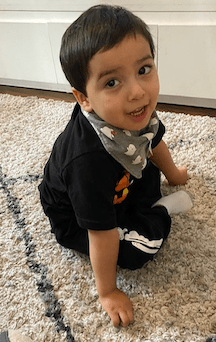
Mar 29, 2024
The participant was diagnosed prenatally with congenital heart disease. He was born at full term via elective Caesarian section (C-section).
Upon delivery, the participant’s Apgar score was normal, and newborn screening was normal. However, an echocardiogram suggested a rare type of heart muscle disorder (non-compaction cardiomyopathy with prominent right and left ventricular trabeculations with dyskinetic septal motion and depressed right ventricle systolic function). The participant was also diagnosed with structural heart defects (ventricular septal defect, patent foramen ovale) and he was transferred to the NICU. He stayed in the hospital for 5 days.
The participant initially showed normal development until loss of some motor milestones was noticed around 8 months.
At 11 months, concerns for seizures were raised. Two EEGs showed notable findings (isolated left frontal spikes), and an MRI showed differences in the brain (subcortical atrophy due to increase in bifrontal-parietal vascular spaces).
By 17-18 months, the participant lost the ability to pull to stand, crawl, roll over, grab objects, and feed himself. The decline of motor milestones paused when the participant was administered vitamin E, Sinemet, baclofen, vitamin B12, coenzyme Q10, and levetiracetam. The seizure episodes were no longer noticed after taking levetiracetam.
At 21 months, the participant was admitted to the hospital where a brain MRI showed changes in the brain (mild widening of the cerebellar and cerebellar vermis fissures, fourth ventricle consistent with global cerebellar volume loss). Exome sequencing and mitochondrial DNA testing were completed.
By 34 months, the participant was diagnosed with global developmental delay and a possible seizure disorder with cerebellar and subcortical atrophy. There was also suspicion for a mitochondrial disorder.
The participant has a good appetite and a balanced diet. However, difficulty chewing and swallowing was noticed. He sleeps up to 12 hours at night without drinking or eating. The participant has poor growth and weight gain, consistent with failure to thrive. He is currently nonverbal and needs assistance to walk.
The participant’s brother was born prematurely (32 weeks), had developmental delay, and died in his sleep at 20 months.

Clinicians and researchers are investigating the following genetic changes to see if they are causing the participant’s symptoms:
If this participant sounds like you or someone you know, please contact us!